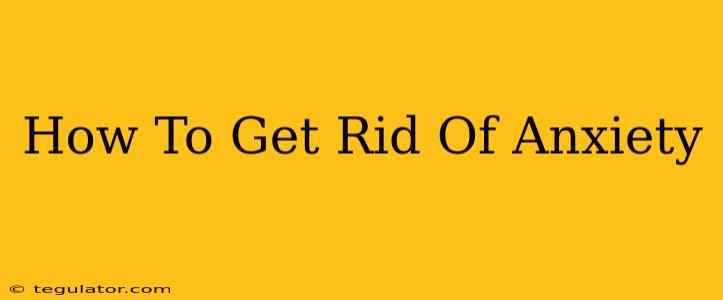Anxiety. That persistent feeling of unease, worry, and fear that can creep into our lives and disrupt our peace. It's a common experience, affecting millions worldwide, but that doesn't diminish its impact. This comprehensive guide explores effective strategies to manage and reduce anxiety, helping you reclaim your sense of calm and well-being.
Understanding Your Anxiety
Before diving into solutions, it's crucial to understand the nature of your anxiety. Is it generalized anxiety disorder (GAD), social anxiety, or triggered by specific situations? Recognizing the root cause can guide you towards the most appropriate coping mechanisms. Consider keeping a journal to track your anxiety triggers, intensity, and duration. This self-awareness is the first step towards effective management.
Identifying Triggers
What situations, thoughts, or events tend to trigger your anxiety? Identifying these triggers is paramount. Common triggers include:
- Stressful life events: Job loss, relationship problems, financial difficulties.
- Social situations: Public speaking, large gatherings, meeting new people.
- Physical health concerns: Underlying medical conditions can exacerbate anxiety.
- Substance use: Alcohol and caffeine can worsen anxiety symptoms.
- Negative thought patterns: Rumination and catastrophic thinking.
Practical Strategies to Reduce Anxiety
Once you understand your triggers, you can begin implementing effective strategies to manage your anxiety. Remember, consistency is key. These techniques are most effective when practiced regularly.
1. Lifestyle Changes for Anxiety Relief
- Regular Exercise: Physical activity is a powerful anxiety reducer. Aim for at least 30 minutes of moderate-intensity exercise most days of the week. Even a short walk can make a difference.
- Healthy Diet: Nourish your body with a balanced diet rich in fruits, vegetables, and whole grains. Limit processed foods, sugar, and caffeine, which can worsen anxiety.
- Sufficient Sleep: Aim for 7-9 hours of quality sleep each night. Establish a relaxing bedtime routine to promote better sleep.
- Mindfulness and Meditation: Practicing mindfulness and meditation can help you become more aware of your thoughts and feelings without judgment, reducing the intensity of anxiety. Even a few minutes a day can be beneficial.
2. Cognitive Behavioral Therapy (CBT) Techniques
CBT is a highly effective therapy for anxiety. It helps you identify and challenge negative thought patterns and develop healthier coping mechanisms. Key CBT techniques include:
- Cognitive Restructuring: Identifying and challenging negative or unrealistic thoughts.
- Exposure Therapy: Gradually exposing yourself to feared situations or objects in a safe and controlled environment.
- Relaxation Techniques: Progressive muscle relaxation, deep breathing exercises.
3. Relaxation Techniques for Immediate Relief
When anxiety strikes, these techniques can provide immediate relief:
- Deep Breathing Exercises: Slow, deep breaths can calm your nervous system. Try the 4-7-8 breathing technique (inhale for 4 seconds, hold for 7, exhale for 8).
- Progressive Muscle Relaxation: Systematically tense and relax different muscle groups to relieve physical tension.
- Guided Imagery: Visualize calming scenes to distract yourself from anxious thoughts.
4. Seeking Professional Help
If your anxiety is significantly impacting your daily life, don't hesitate to seek professional help. A therapist or counselor can provide personalized guidance and support, helping you develop effective coping strategies. They can also help determine if medication might be beneficial in your case.
Maintaining Long-Term Anxiety Management
Managing anxiety is an ongoing process. It requires commitment and self-compassion. Remember to celebrate your progress, and don't be discouraged by setbacks. By consistently practicing these strategies, you can significantly reduce your anxiety and live a more fulfilling life.
Keywords: anxiety, anxiety relief, reduce anxiety, manage anxiety, anxiety treatment, anxiety symptoms, coping with anxiety, anxiety disorder, generalized anxiety disorder, social anxiety, anxiety management techniques, CBT for anxiety, relaxation techniques for anxiety, mindfulness for anxiety, meditation for anxiety, healthy lifestyle for anxiety, deep breathing exercises, progressive muscle relaxation.

